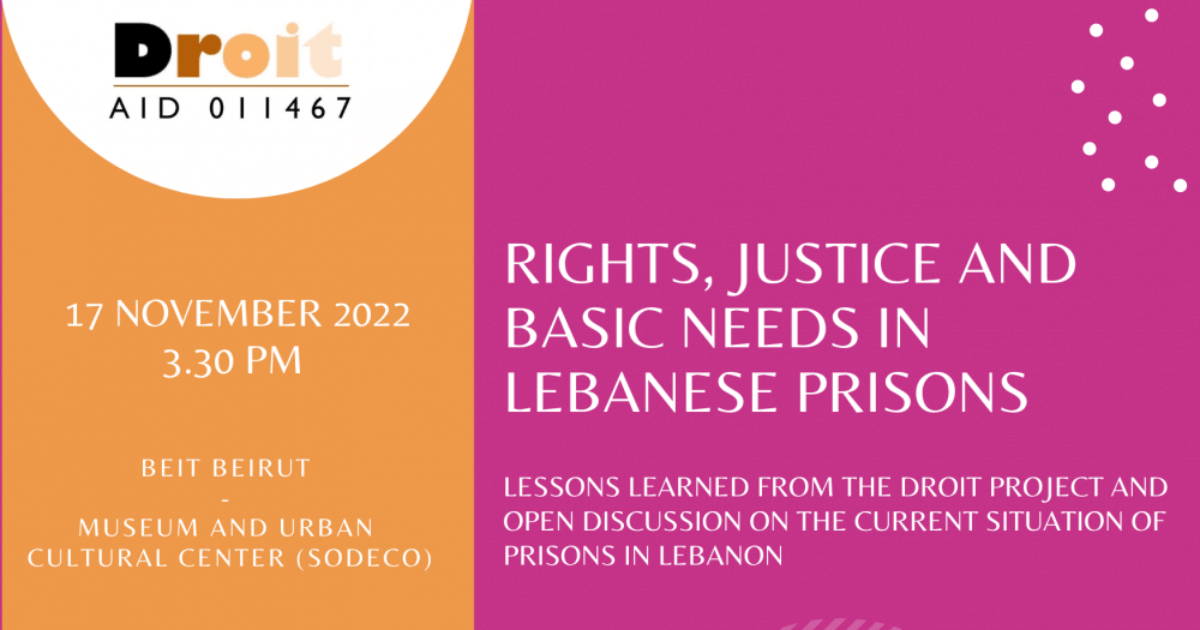
- This event has passed.
Rights, Justice and Needs in Lebanese Prisons.
November 17, 2022 - 15:30 - 17:30

On Thursday, November 17, as the closing event of the DROIT project, the “Rights, Justice and Basic Needs in Lebanese Prisons” meeting was held at Beit Beirut, an important opportunity to present and discuss the results achieved through the DROIT project and analyze the increasingly urgent needs of the prison system in Lebanon.
Speakers at the event included the Director of the Italian Development Cooperation Agency in Beirut, the Director of ARCS, representatives from the Ministry of Justice and ISF, the two project partner NGOs Mouvement Social and AJEM, the Task Force Coordinator, and former Lebanese Interior Minister Ziyad Baroud.
The DROIT project, co-funded by the Italian Agency for Development Cooperation, was managed by ARCS in partnership with Lebanese NGOs Mouvement Social and AJEM and Italian partners ARCI Toscana, the Garante dei Diritti dei Detenuti delle Regione Toscana, Antigone, and No Peace Without Justice.
Background
Lebanon has a prison population of more than 8,000 inmates (between prisons and other detention facilities), nearly 80 percent of whom are awaiting trial.
In Roumieh Prison alone, the country’s largest, the number of detainees exceeds the planned capacity by three times, and the proportion does not differ much in other prisons, such as in Tripoli in the north and Zahle in the Bekaa Valley.
At the operational level, it is the Lebanese Internal Security Forces (ISF), then the Ministry of Interior, that is responsible for management, despite often lacking specific knowledge and training to work as prison guards.
As of 2019, Lebanon is experiencing an unprecedented economic crisis. GDP per capita has fallen by 40 percent, the local currency has seen 95 percent of its value lost in the face of rising inflation, and recent data has pushed about 80 percent of the population below the poverty line. The World Bank says Lebanon is experiencing one of the three worst global economic slumps since 1850.
If the country’s socioeconomic crisis is dramatic in general, the consequences are even more severe within prison facilities. Cases of escapes from detention facilities, the most recent of which occurred from the Adlieh underground prison in Beirut, reflect their unsustainable situation. The quality and quantity of meals distributed by the prison administration have decreased. Inflation is reducing inmates’ financial means and making food supplies difficult. Family visits are increasingly infrequent, partly due to the high cost of fuel (a full tank of gasoline, after the removal of state subsidies, has come to cost as much as an average state salary), as has the supply of basic necessities.
Activities carried out
In this context, civil society organizations are often called upon to provide many of the services that by law should be guaranteed by the state: legal assistance, staff training, psychological or medical support. The DROIT project, in partnership with the Lebanese NGOs Mouvement Social and AJEM, active since 2018, has contributed to enhancing recovery services, social reintegration, assistance aimed at prisoners/prisoners, people at risk and their families, and training of prison workers. The intervention, in particular, supported the strengthening of services offered in two Lebanese prisons (Roumieh and BEK), to improve the general conditions of detention, and at the Rabieh rehabilitation center, to support the rehabilitation and social reintegration processes of detained persons.
It also included the meeting and exchange of practices on prison issues thanks to the collaboration with the Italian partners of ARCI Toscana, the Garante dei Diritti dei Detenuti delle Regione Toscana, Antigone and No Peace Without Justice. In addition to a series of roundtables organized in-person and online between 2019 and 2022, in June this year a Lebanese delegation, composed of representatives of NGOs, the Lebanese Ministry of Justice and the Ministry of the Interior, paid a visit to several Italian penitentiary centers, in Tuscany and Rome, during which it was possible to compare the two systems and the legislative traditions underlying prison management, while also putting on the table the common difficulties and challenges faced, starting with the issue of overcrowding
